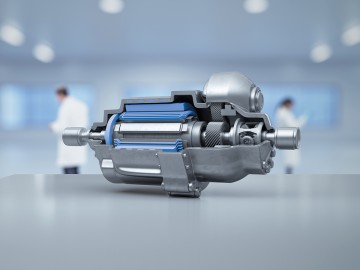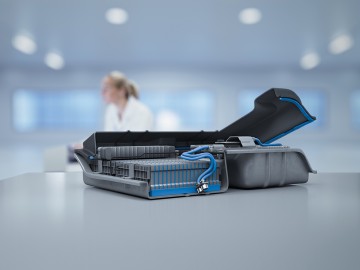
WACKER Opens the Door to New Markets in the Automotive Industry
In 2016, the International Automotive Task Force – IATF - a group of large automotive manufacturers and international automotive associations – published the IATF 16949 standard. With this, the automotive industry summarizes the requirements that have to be met by suppliers’ company structures and quality management systems. WACKER, too, has recently had a part of its silicone business certified to IATF 16949. The editorial team discussed this project with Dr. Thorsten Schneppensieper, head of Global Customer Service at WACKER and Dr. Sebastian Rommel, Global Segment Manager – Automotive, who jointly promoted the certification.
What are the automotive industry’s goals with IATF 16949?

Dr. Sebastian Rommel, Global Segment Manager – Automotive at Wacker Chemie AG
Rommel : With this standard, the automotive industry wants to minimize all risks that might threaten production, and to ensure that suppliers operate reliably. The industry is aiming for continuous, absolutely smooth automotive production. To achieve this goal, the automotive industry uses the IATF standard to place strict requirements on the company structures and the quality and risk management of its suppliers.
Customers know WACKER for the consistently high quality of its products. Does the automotive sector really need special proof?

Dr. Thorsten Schneppensieper, head of Global Customer Service at Wacker Chemie AG.
Dr. Thorsten Schneppensieper: The automotive industry has exceptionally high requirements that relate to the sector’s typical supply chain. Suppliers are responsible for at least three-quarters of the entire value creation inherent in the production of a vehicle. Carmakers process the supplied parts and materials using fast and highly automated manufacturing processes. Assembly lines standing idle because of faulty components or materials, or a delivery delay, would result in high costs. If you consider the costs that face car manufacturers in the event of a product recall, not to mention the damage to their image, it is understandable why they are have created a special standard for a highly engineered and complex entity like a car. To ensure value creation, automotive manufacturers expect a zero-error strategy from their suppliers. The IATF 16949 standard is intended to ensure zero errors throughout the entire value creation chain. A supplier not certified to this standard has almost no chance of working directly with the car industry.
What are the main requirements of IATF 16949?
Schneppensieper Error avoidance, risk management and reliability are at the core of IATF 16949. The notion of error avoidance is particularly important: instead of reacting to malfunctions and correcting errors, such errors should not even arise. This minimizes the failure risk for automotive manufacturers and the liability risk for suppliers. The standard not only states what needs to be done, but also specifies how this should be achieved, i.e. what quality-assurance measures need to be undertaken in particular. It also entails meeting every single customer-specific requirement in full. In addition, IATF 16949 requires suppliers to continually improve their processes. The automotive standard formulates requirements regarding processes, workflows and management methods for those parts of the company that develop and manufacture products for the automotive industry.
“To achieve value creation, automotive manufacturers expect a zero-error strategy from their suppliers. The IATF 16949 standard is intended to ensure zero errors throughout the value creation chain."
Dr. Thorsten Schneppensieper, Global Customer Service manager at Wacker Chemie AG.WACKER SILICONES has allowed itself several years for the certification. Why has the business division performed the certification just now?
Statement Dr. Robert Gnann, President WACKER SILICONES
Rommel : Until recently, material manufacturers hardly ever supplied the automotive producers directly. In the past, our silicone products for automotive applications were supplied almost exclusively to part and component manufacturers, and thereby to companies operating in upstream stages of the value creation pyramid. However, with the transformation to electromobility, the supply chain has changed: some automotive manufacturers now manufacture key systems for electric vehicles – such as drive batteries or on-board charging units – themselves or in joint ventures with suppliers. The suitable materials – including silicone products from our portfolio – are more and more required directly at the automotive manufacturers’ production lines. The electromobility revolution is proceeding apace, so that demand for silicone specialties is growing rapidly. We – WACKER – want to participate in this growth market. This is therefore just the right time for us to perform the certification.
Are there silicone products that have become indispensable for electric vehicles?
Rommel : We are seeing extraordinarily high demand for silicone-based thermally conductive materials from the automotive manufacturers – for example for our thermally conductive gap fillers and thermally conductive potting compounds. Such materials are used in electric vehicles, for example for thermal management of the drive batteries and the charging unit. Both components become very hot during use, particularly during fast charging, which can lead to severe damage unless adequate cooling is provided. The thermally conductive materials help to effectively dissipate the generated heat to the heat sinks or cooling system and thereby ensure reliable operation and a long lifetime. Thermally conductive potting compounds can additionally perform yet another function: they protect the surface of the power electronics against environmental effects. Both types of silicone-based thermally conductive materials have become indispensable in the manufacture of electric vehicles, because, as silicones, they are not only electrically insulating but also heat and aging resistant, and therefore have superior properties to other classes of materials.
Which parts of the company has WACKER had certified according to IATF 16949?
Schneppensieper : Of course, it primarily involved the manufacture of thermally conductive silicone products. They include addition-curing RTV-2 compounds. These are two-component silicone-rubber formulations that are cured by an addition reaction to form a silicone elastomer. We have therefore certified those parts of the company that manufacture these RTV-2 silicones – specifically, certain areas of the silicone plants at our sites in Burghausen/Germany and Zhangjiagang/China – together with all the supporting functions such as product development, strategic planning, HR, procurement, marketing and sales.
“By fulfilling the IATF standard, we have created robust – i.e. failure-proof – transparent and traceable processes and workflows for our RTV-2 silicone plants.”
Dr. Sebastian Rommel, Global Segment Manager – Automotive at Wacker Chemie AGWhat test organization conducted the certification and what was the procedure like?
Schneppensieper : We commissioned TÜV Nord to do the certification As specified in the standard, we first had to submit a detailed plan for the quality management system of the company part to the test organization, and show with suitable documentation that we had already been working for a year according to the stipulations of IATF 16949. We had already identified and eliminated weaknesses, adapted our workflows and processes to the requirements of the standard and installed additional systems for error avoidance. For example, as part of our continuous improvement efforts, we pursued the long-term goal of building up our automation to almost entirely eliminate manual errors by our operators. After examining the submitted documents, TÜV Nord conducted an initial audit with us, the so-called phase 1 audit, and assessed us as ready for certification. Some weeks later, two auditors then spent several days with us to put our quality management system through its paces in the phase 2 audit. Having passed the audit, we have now received the certificates in February 2022.
Does that mean that WACKER now offers its entire portfolio of addition-curing RTV-2 silicones with IATF certification?
Statement Duke Cho, Vice President Industrial Solutions WACKER SILICONES
Rommel : No, not at all. An IATF-compliant quality management system and production involves far too much work – and is just not needed in many cases. Although we manufacture all our addition-curing RTV-2 silicones on the plants of the certified company parts, we only selectively offer certain silicone compounds to the automotive industry within the scope of the certification. We signal this selection to our business partners with the name “WACKER Silicones Automotive Solutions” – WACKER SAS for short – which we use in our sales brochures and other documentation. Besides the silicone-based thermally conductive materials, this portfolio also includes particular automotive silicone adhesives as well as a steadily growing number of other, non-thermally conductive RTV-2 compounds.
How does WACKER benefit from the certification?
Rommel : “By fulfilling the IATF standard, we have created robust – i.e. failure-proof – transparent and traceable processes and workflows for our RTV-2 silicone plants.” As we conduct our processes in compliance with IATF, we also have full control of our liability risk with respect to the automotive industry. In addition, the certification allows us to prove to the automotive industry that we are a reliable business partner. This opens doors for us to new markets in the world of the automotive manufacturers.








